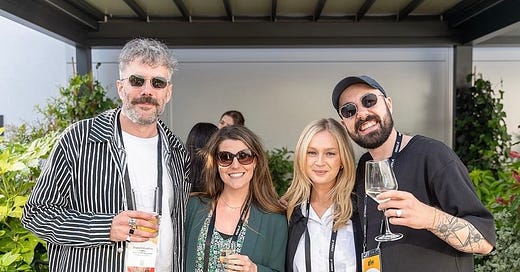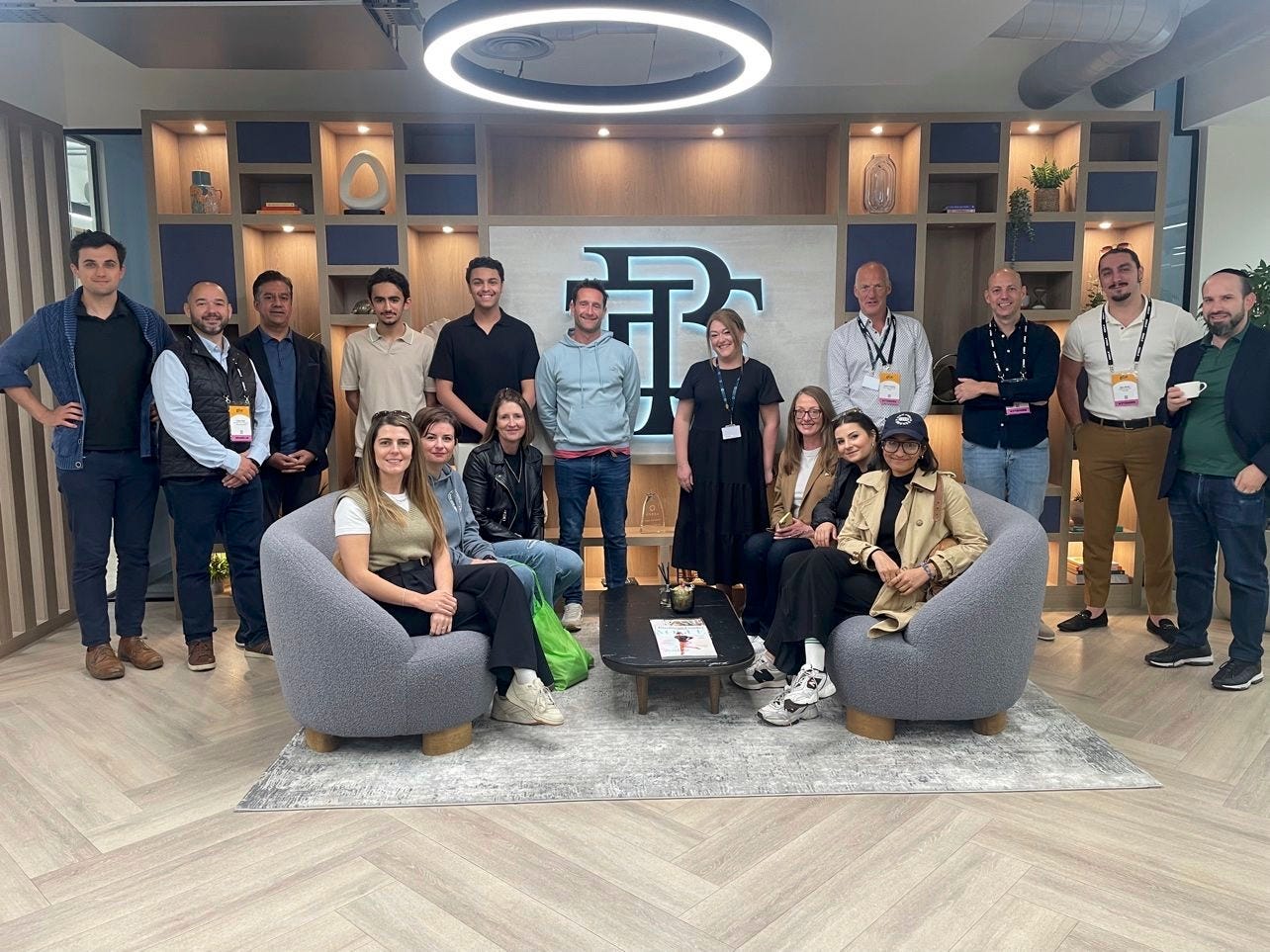GCUC UK Manchester: The Future of Coworking is Flex
Regional coworking is in vogue, not least because of the shifting nature of work.
Source: GCUC
by Christian Schmitz and Lucy McInally
The coworking movement continues to transform how people work and live. London has recently experienced closures of large workspace operators while corporations continue to place return-to-office mandates on their workforce.
Meanwhile, employees themselves are leaning into flexible working practices, seeking out their local neighbourhood workspace (which has the added bonus of thriving communities). Work no longer centres around the capital.
Regional coworking is in vogue, not least because of the shifting nature of work.
It was very fitting then that GCUC – the world’s largest coworking conference – came to the UK’s second city of Manchester for the first time in June. Organised by Emilie Lashmar, hosted by Heather Gray, Sales Director at Clockwise, and attended by many people in the European coworking community, GCUC UK Manchester was a big hit.
This article details some of the highlights from the discussions, panels, and tours.
Capital of the UK regions
Opening GCUC UK Manchester, CBRE’s Daniel White (Head of Flex Advisory) gave us the low down on the coworking and flex boom beyond the capital. Accepting that Manchester is the UK’s second city in terms of development, investment, and growth, Daniel explained how coworking came to regions in the first place – it’s all because of WeWork. Being the first large-scale workspace operator to move out of London, WeWork prompted the trend of bringing coworking to the UK’s regional cities.
In conversation with Sarah Kelly (Workspace Director at Avenue HQ), Chris Mapp (COO at Wizu Workspace), and Jack Maher (Head of Flexible Workspace at Bruntwood Sci Tech), Daniel explained how life beyond the capital attracts people to move out of the capital and into the regional cities, which offer much cheaper lifestyles leading to a better quality of life.
Flexible working is more mainstream, satellite offices have popped up across the regions, and companies are open to leasing desks in residential workspaces. Good transport links nationwide enable rural dwellers to travel into Britain’s cities to reach workspaces. More workspaces increase job opportunities, retaining talent from top universities, and small businesses are a perfect customer for coworking as “every penny counts,” says Chris, thanks to the shorter, flexible, and cheaper leases. These are just a few of the current trends impacting the coworking movement.
As flex moves towards hospitality-infused spaces, hotelification is this year’s buzzword. Gone are the white box offices, we expect to walk into beautifully designed workspaces complete with breakout space and hospitality offerings, including a coffee bar. Investment is being pooled into wellness spaces, like rooftops and Yoga studios. Be prepared to adapt inventory towards demands, says Jack, sharing an example of transforming an event space in Harrogate into coworking to make better returns.
Source: GCUC
To BCorp or not to BCorp?
After touching on coworking’s environmental impact, the opening panel ended with Chris stating: “ESG needs to be on everyone’s minds.” This fittingly brings us to the following discussion around sustainability accreditations, hosted by Aceil Haddad, Founder of MATT PR.
Aceil began asking the audience about their views on BCorp accreditation (which proves that a company “meets high standards of social and environmental performance, transparency, and accountability”). Interestingly, only a small number of the audience wanted to go down the BCorp route and felt that it was making a difference.
This set up the debate between the panel, featuring Sophie Turnbull (Commercial Director at Huckletree), Alexandra Livesey (COO at Clockwise), Will Kinnear (Director at HEWN), and Adam Sandford (Regional Lead at Runway East).
So, what did the panel think about the accreditation? Clockwise, for example, is really careful about the accreditations they pursue, purposefully choosing not to become a BCorp, as it felt to them more like a marketing tool than contributing to an overall cultural change. While in agreement that BCorp is a marketing tool to an extent, Adam felt that it has transformational outcomes. It provides a good roadmap for making changes, says Sophie, however, the downside is the cost to achieve and maintain it.
Despite whether these workspaces are BCorps or not, they certainly do their bit for the environment. Instead of throwing office furniture away, for instance, Huckletree recently gave pieces of furniture away to a local school. They’ve been a fully vegetarian office since 2018 (and have plenty of milk alternatives too) and have competitions between sites to encourage the community to do their bit too. Likewise, Clockwise has “gamified” its sustainability efforts. Even though the arguments on both sides were convincing, no one in the audience wanted to become a BCorp by the end of the discussion.
Circular economies
Continuing the conversation around sustainability, one of the last panels brought four design experts together to talk about circular furniture. Led by Steven Gayle (Projects Director at Cast Interiors), Paul Nellist (Managing Director, Koba), Dean Connell (Founder at IAMDC), and Angela St Clair-Ford (Director at JRA).
A staggering 300 tonnes of office furniture is thrown into landfills daily. The panel called for the industry to think more consciously about furniture usage, with Dean, who designed WeWork offices around the world, before setting up his own practice honouring circular design, asking the audience to think about the lifetime usage of furniture, for example, pieces that could return to their natural state (like wood), or creating multi-functional furniture, that doubles as a desk and dining room table.
This topic reminds Christian and me of industrial designer, Irena Übler’s work – a specialist in developing ecological solutions in product and furniture design. Irena implements emerging artistic perspectives while establishing connections between human identity, design, and environmental responsibility.
Read more about SALTO’s collaboration with Irena and Porto’s first “fab-lab,” Opo’Lab.
After the panel, Christian and Dean discussed how smart furniture could provide data on whether it's a good fit for the space (or not), in which case the location or type of furniture could be changed.
Source: technologywithin
Data is power
Many digital tools are available at operators’ fingertips, saturating the coworking tech world. But, having too many solutions likely means those tools don’t integrate with one another, leading to difficult decision-making processes.
In a roundtable led by Ed Crabtree (Director of Business Development at technologywithin), attended by Christian and myself, alongside experts from Nexudus, technologywihtin, NCG, and Yardi, the topic of data analytics was discussed at a high level.
The group agreed that basic requirements for technology software ought to ascertain space usage, while working to improve community experience. From frictionless door entry to energy usage smart tech, tech for good can be really impactful (as Sarah put it – “data is power”). For a better understanding of the tools making a difference, Sarah recommends operators check out the Instant Group’s market research.
But although technology is crucial, nothing beats talking to customers and tapping into our feelings and emotions when making certain decisions around a workspace, putting the community first.
A lesson in scaling-up from x+why
GCUC UK Manchester took place at x+why’s gorgeous workspace at 100 Embankment, a glossy, glass tower overlooking the Cathedral. It’s almost a symbol of the brand’s enormous growth and success since launching only a few years ago. In a cosy fireside conversation, x+why CEO, Rupert Dean, told of the brand story to Justin Harley (Regional Director at Yardi).
Originally working as a corporate lawyer, Rupert ran businesses in Africa, including workspaces, before working out the mission behind x+why – combining profit and purpose. Since first launching in London, x+why has scaled up quickly, and it now has a firm presence in the regional cities of Manchester, Birmingham, and Milton Keynes, plus expansion across London.
x+why offers more than just workspace. Some of the sites are member’s clubs with F&B offerings, a popular addition as the flex sector becomes more hospitality-driven.
The business began with a tiny team of three, including Rupert’s wife, Tanya, as CFO. But it now requires a large team across multiple sites. Rupert explained that team growth was down to establishing a constant brand and company culture (that its people stay true to), and giving value at every touchpoint. x+why’s book, Mission Lit, reclaims what purpose means to a business, including interviews behind brands that deliver true impact, like Patagonia, and Tony’s Chocoloney.
During onboarding processes, new x+why employees read this book, they never start work on a Monday and are matched with a buddy who supports them in those important first few weeks. These are just a few examples of the processes x+why implements to form a healthy company culture.
Source: technologywithin
Coworking tours
To showcase the fabulousness of x+why Manchester, we were all invited to the sunny rooftop following the conference before attending a lively festival-themed after-party at Clockwise (hosted by technologywithin) — fancy dress compulsory!
We all loved dancing to the live band music, getting glitter face paint, and taking fun photos in the car photo booth parked outside. The next morning, Lucy attended the coworking tour led by technologywithin, starting with a much-needed breakfast at Orega before we were shown around the serviced offices.
On the tour, we were fortunate to see some of Manchester’s industrial history (for which it’s well-known). For example, Orega, a serviced office brand, is based at an old textile factory – The Tootal Building – protected by English Heritage. Rather than selling coworking memberships, Orega has plenty of breakout spots from sofas dotted around the space, and the big kitchen, complete with natural, Scandi-inspired wooden floors and soft furnishings, for serviced office clients. Phone booths are shared between the community, and they have a lovely garden, where they host summer parties.
A short walk away, and we were back at Clockwise Manchester. Miraculously, all the glitter from the night before was swept up and the room restored to order – by day, the ground floor operates as the hot-desk coworking area and cafe (called Two Hands). We were shown around the communal spaces and the flexible workspaces, including the phone booths and shared first-floor kitchens.
Before we all said our goodbyes, we visited Industrious, occupying several floors in the Landmark building (the home of HSBC in Manchester). The building has only recently reopened following a disastrous accident with a sprinkler on the roof, flooding the entire building and resulting in it being out of action for an entire year during restoration. It’s back up and running today. Met by the community manager in the cafe-reception (and offered a sweet treat as Fridays are donut day – a lovely touch!), we toured a large private office and meeting room.
Source: GCUC
What’s next in flex?
GCUC UK Manchester proved an educational couple of days, learning more about the success of regional coworking and shifting working practices. We thoroughly enjoyed meeting one another, our clients and partners, and look forward to the next GCUC UK in London in October. Will we see you there?









